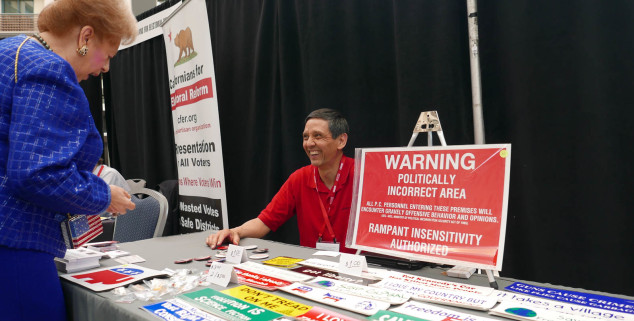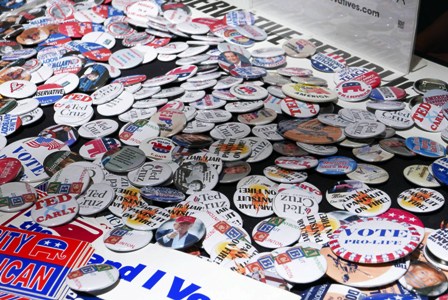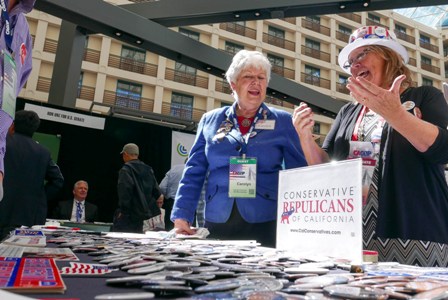News
Political buttons: Snarky, terse, fun
 A vendor hawking buttons, stickers at the Callfornia Republican Party convention. (Photo: Serla Rusli)
A vendor hawking buttons, stickers at the Callfornia Republican Party convention. (Photo: Serla Rusli)Judy DeVries was in her car when she heard the surprise news that Ted Cruz had selected Carly Fiorina as his running mate. She knew immediately what she had to do.
“We’re like ‘Oh my goodness, we have a VP,” she said. “We need to make buttons!”
Days later, at the California Republican Convention, DeVries was doing brisk business selling buttons for a buck a piece, or six for $5. “We’re wheeling and dealing,” DeVries tells those who linger over her wares.
It turns out, you can make a healthy profit selling buttons for a buck apiece, or six for five.
The Cruz-Fiorina buttons turned out to be her best seller, followed by a few anti-Hillary buttons. DeVries’ favorite of that genre? “Liar, liar, pantsuit on fire,” she says, laughing.
DeVries does have a button featuring Donald Trump, but his signature red hat has been photoshopped to read “Cruz for President.” DeVries is associated with the group Conservative Republicans of California, which has endorsed Cruz.

Buttons on the table (Photo: Serla Rusli)
Political buttons have played a role in U.S. politics since 1896, when the first modern button appeared, allowing people to declare their support for fiery populist William Jennings Bryan. Since then, buttons enjoy a heyday every four years, and are ubiquitous at political conventions.
But here at the Republican convention, Judy DeVries and her husband, Earl, are the only vendors specializing in buttons. For them, it’s about ideology, but it’s also about the money. It turns out, you can make a healthy profit selling buttons for a buck apiece, or six for five.
“It’s capitalism at its finest,” Judy said, “making them in the middle of the night, and selling them all day long.”
Four years ago, the DeVries made enough money selling homemade buttons to pay for their trip to the national Republican convention in Tampa.
“It’s capitalism at its finest,” Judy said, “making them in the middle of the night, and selling them all day long.”
For some, the sound of money is cha-ching. For the DeVrieses, it’s the ker-chunk, ker-chunk of a button-making machine.
At the Tampa convention, Judy and her husband made a stir, decked out in jackets covered in buttons. She said they were featured in the national media.
Irvine sold out of Donald Trump buttons, only to see them being re-sold just feet away.
What is it about buttons that attracts entrepreneurs like DeVries and her many customers?
“I think we all want to say something succinctly,” she said. “We all want to have our own little soundbite, and that’s what [buttons] are.”
Don Irvine was also selling buttons at the convention, but his main trade was in bumper stickers — “Keep honking, I’m reloading,” “I love animals, they’re delicious,” “Fight crime, shoot back,” etc.
For someone selling rather hard-edged bumper-stickers, Irvine was a surprisingly gentle, gregarious man, who said the bumper stickers he sells are meant to be taken with a sense of humor.

Hawking their wares at the Republican state convention. (Photo: Serla Rusli)
Irvine is a convention veteran who has been coming to California Republican conventions since 1989. He said there was a larger crowd than usual this year, due to what he calls the “Trump effect.”
In fact, Irvine sold out of Donald Trump buttons, only to see them being re-sold just feet away. He had about 30 Trump buttons, and “a couple of ladies” bought them all, for a dollar each.
The ladies then donated the buttons to the Trump booth, who had run out. The Trump booth began selling the buttons for two dollars each. Still, Irvine wasn’t perturbed.
“I thought, that’s capitalism,” he said. “That’s what the free market is, and that’s what they should be able to do.”
While the DeVrieses sell buttons in part to raise money, Irvine sells bumper stickers, buttons, books, and Republican neckties, and other items as a side business. His main role is chairman of Accuracy in Media, Inc., a conservative media watchdog group founded by his father in 1969.
Irvine is a Republican, but he doesn’t have strong feelings about the presidential primary, saying he’ll support the eventual nominee. He was selling both Cruz and Trump buttons.
Judy DeVries, a Cruz supporter, was focused on selling buttons extolling Cruz and the Republican party, along with those condemning Clinton. Given the “Trump Effect,” would DeVries sell Trump buttons, if it meant making a bigger profit?
“Would I sell my soul for monetary gain?” she said, laughing. “Probably not.”
—
Ed’s Note: Reporter Sam-Omar-Hall and Photojournalist Serla Rusli are students at UC Berkeley’s Graduate School of Journalism.
Want to see more stories like this? Sign up for The Roundup, the free daily newsletter about California politics from the editors of Capitol Weekly. Stay up to date on the news you need to know.
Sign up below, then look for a confirmation email in your inbox.

Leave a Reply